Officials reduce poverty and promote self-sufficiency in Sichuan province
p.china.org.cn by Zhao Binyu,October 27, 2020 Adjust font size:
Known as a “land of abundance,” Sichuan province is home to the fertile Chengdu plain, which is nourished by the Dujiangyan water conservancy project. The administrative area has historically also contained large, contiguous impoverished regions, however, including its vast plateau areas, the Qinling-Daba mountains region, the Wumeng mountains region, and Liangshan Yi autonomous prefecture.
Diligence can lead to happiness, and hard work can make dreams come true. Vast numbers of impoverished Sichuan residents have been making unremitting efforts to become more prosperous and self-sufficient in order to live happier lives and help develop a comprehensively and moderately prosperous society ever since Party officials spearheaded a poverty alleviation campaign in the province.
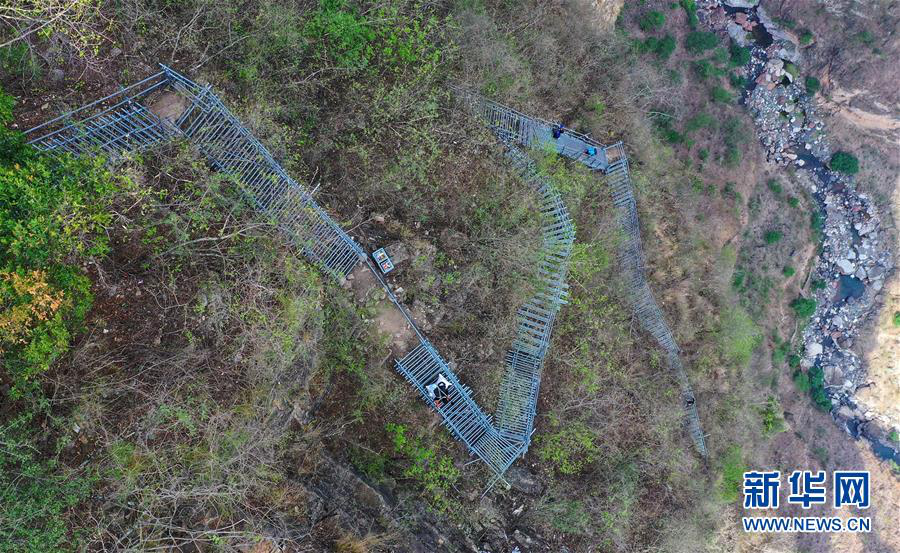
Residents of Atulie’er village, Zhaojue town, Liangshan Yi autonomous prefecture, Sichuan province walk down a steel staircase mounted on the side of a stretch of the Daliang mountain that runs through the area. (Xinhua/Wang Xi)
Commitment to poverty eradication
Pachayouge, first secretary of Atulie’er village, Zhaojue town, Liangshan Yi autonomous prefecture, recently began a busy day at the site of a steel staircase mounted onto the side of a stretch of the Daliang mountain that runs through the area. The staircase was shining under the morning sun.
“Eighty-four impoverished households were able to relocate to a new resettlement community near the county seat of Zhaojue in May,” Pachayouge stated. “Some villagers are still living in the mountains, however. We also have a lot more work to do, such as developing farms and orchards and pursuing cattle and sheep farming endeavors, and tourism, to name a few.”
Pachayouge had been working for the Zhaojue county government and was designated first secretary of Atulie’er in 2015 when he was 29. That year his daughter was two-year-old and his wife was pregnant with a second child.
“When I first came to Atulie’er, 17 simple rattan ladders ran up a stretch of the Daliang mountain before the steel staircase replaced them,” Pachayouge explained. “They were very steep and ran almost completely vertically in some places.” The official spent more than three hours ascending the rattan ladders to reach the village.

A segment of the new steel staircase which provides better access to Atulie’er village (Xinhua/Wang Xi)
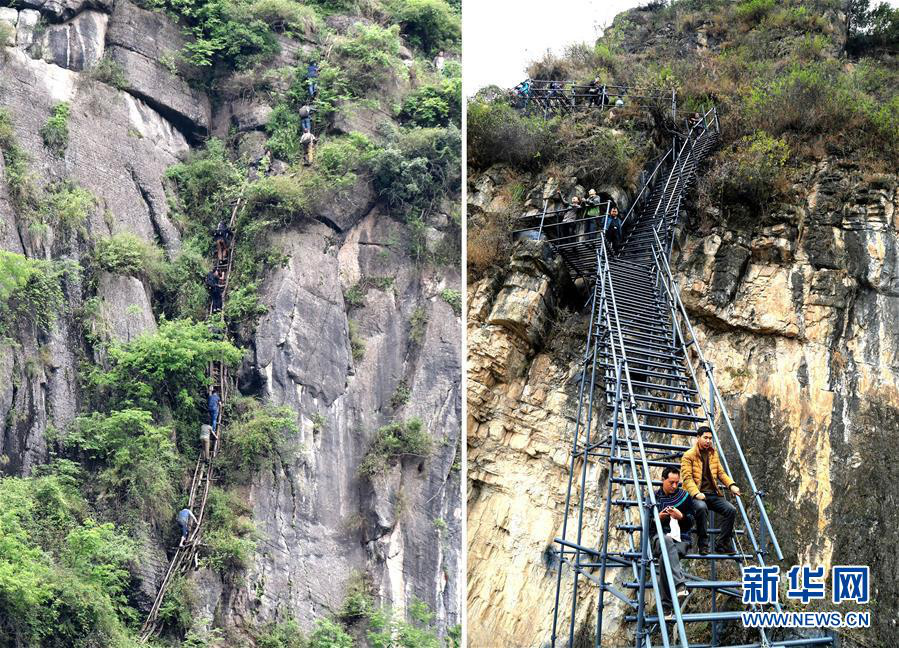
Ascending the rattan ladders that used to exist in Atulie’er on May 14, 2016 (left) Atulie’er residents sit on the village’s new steel staircase on Dec. 5, 2017. (right) (Akejiushe/Xinhua)
“Atulie’er’s residents lived in adobe homes with low ceilings and had neither mobile phone coverage nor tap water,” Pachayouge noted. “The photovoltaic systems that they owned could power their lights but not much else, and people mostly grew corn and potatoes for income.”
“I have been doing my best since the government entrusted me to help the village out of poverty,” Pachayouge mentioned. He has been working with other officials in Atulie’er for several years now.
“Great changes have occurred as a result of the efforts that the officials stationed in Atulie’er and its residents have made. Cooperatives devoted to sheep, navel orange, prickly ash, and walnut farming have been established, the rattan ladders were replaced with a steel staircase as part of efforts to develop tourism in the area, a preschool was built, impoverished families were gradually relocated to more habitable areas, to mention but a few.
Residents’ lives in Atulie’er are getting better and better,” Pachaouge said. “The battle against poverty is not over yet, however, and I will remain committed to my post until the work is done.”
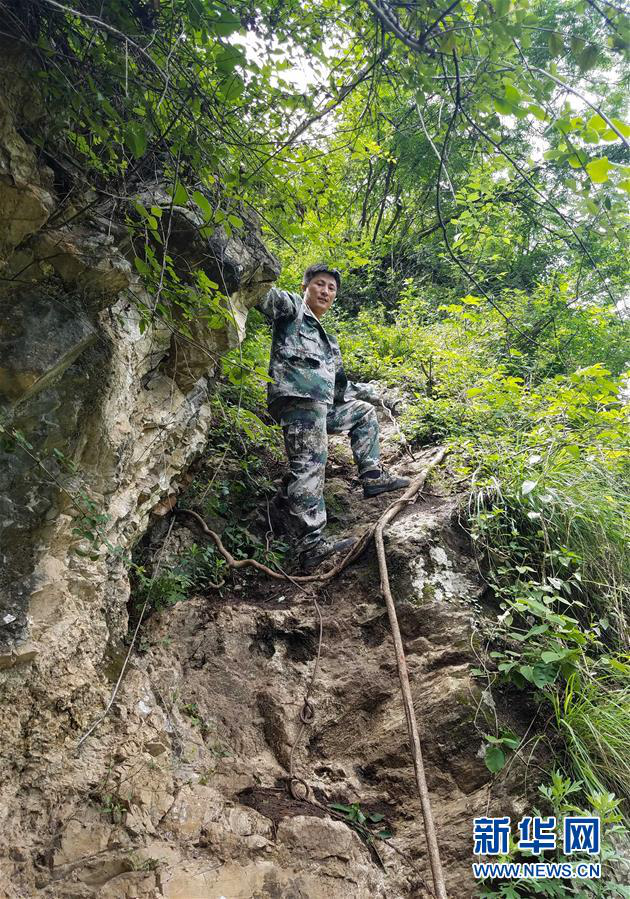
Pachayouge, first secretary of Atulie'er village, climbs up a rattan rope in order to inspect the area where a steel staircase was later mounted. (Xinhua)
Sichuan is one of the provinces in China that has been most in need of addressing the poverty in its borders. Its government has regarded the task as its most important political mission and an opportunity to develop the local economy and improve people’s livelihoods. Pachayouge is one of 59,000 officials that have been assigned to work in the province’s poverty-stricken villages. Sichuan has mobilized the resources of all parties that are involved and made full efforts to integrate them in order to engage in a concerted and comprehensive campaign to eliminate absolute poverty in its borders.
Unprecedented efforts have been made to overcome the obstacles that have stood in the way of poverty relief efforts in Liangshan. In 2018, special teams were formed for each of Liangshan’s 11 deeply impoverished counties, and 5,700 officials from all over Sichuan were assigned to work in the prefecture in order to provide comprehensive assistance to its poverty-stricken residents.
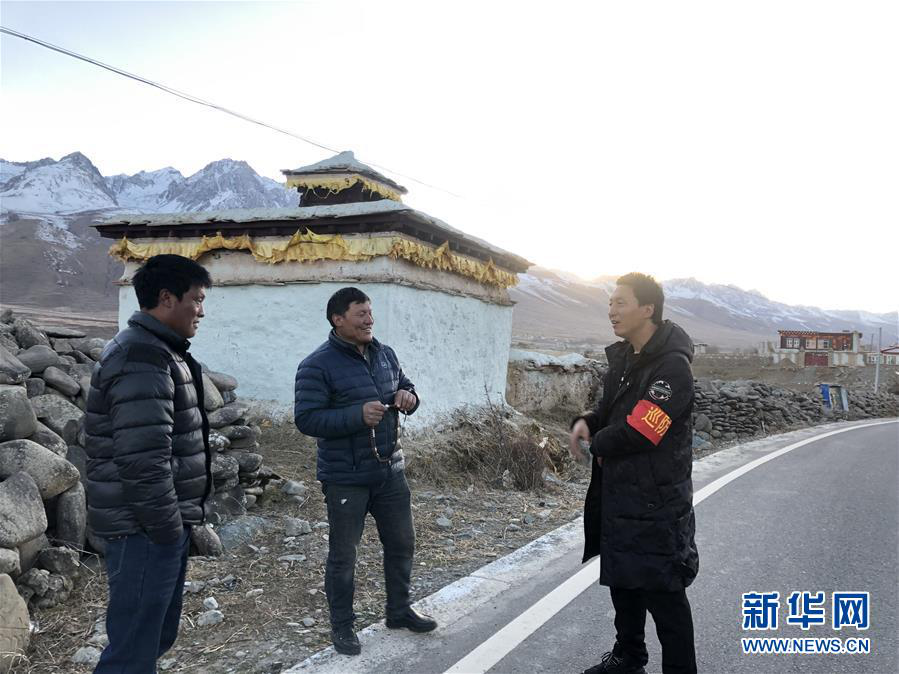
Ma Wusa (right), first secretary of Xialaka village, Ganzi county, Ganzi Tibetan autonomous prefecture, Sichuan province, talks with local residents while he was working in the village. (Xinhua)
“When you left an impoverished area, you came to another poor village. You always concerned yourself about the folks’ life,” a netizen wrote in his post on a website last year after Ma Wusa, an official who devoted his life to poverty reduction endeavors, died. “You treated the villagers like your relatives and you sacrificed everything for us.” The ethnic Yi Agricultural Machinery Extension Service Center employee was born in Liangshan and devoted his energy and wisdom and ultimately his life to eliminating poverty in Sichuan’s Ganzi Tibetan autonomous prefecture. Ma passed away on May 13, 2019 at the age of 38 as a result of a sudden illness that emerged after being overworked.
Records maintained by the Sichuan Provincial Bureau of Poverty Alleviation and Development indicate that 77 officials have sacrificed their lives to addressing and eliminating poverty in the province thus far. These heroes devoted themselves to winning the battle against poverty and remained committed to their goals.
Hard work rather than hardship
Fifty-one-year-old Qin Fazhang lives in Xiaotian village, Nanjiang county, Bazhong city deep in the Qinling-Daba mountains and suffers from disabilities as a result of having contracted poliomyelitis when he was a child and his family was too impoverished to afford his treatment. He left his hometown in order to learn a trade while doing part-time jobs when he was 14 but eventually returned to work as a farmer and lived in poverty for many years despite he had worked hard and diligently.
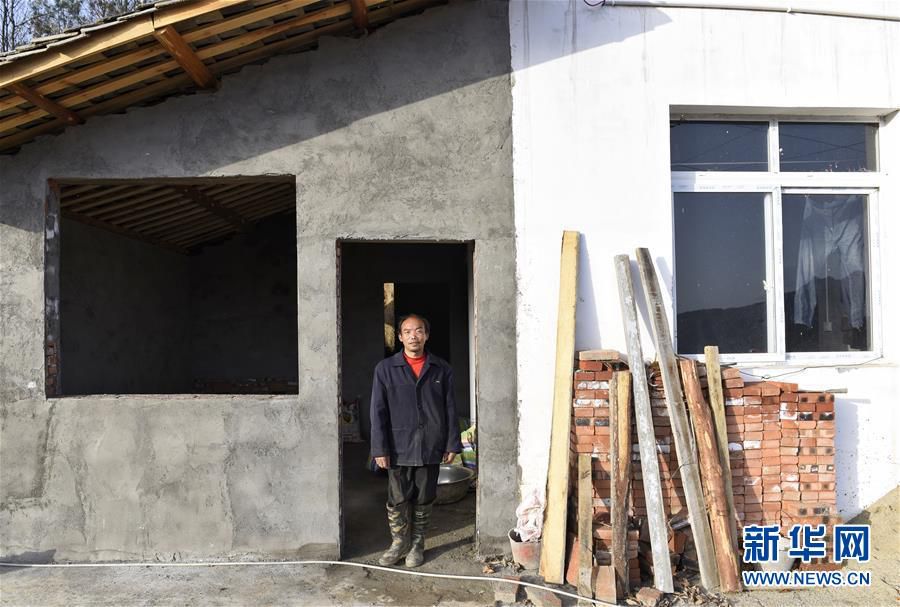
Xiaotian village resident Qin Fazhang in Nanjiang county, Bazhong city, Sichuan province stands in the doorway of his new, partially constructed home. (Xinhua/Liu Kun)
Qin’s family was identified as impoverished after China launched its targeted anti-poverty campaign in 2014. He felt motivated by policies that were designed and implemented to help people in his situation, however, and became determined to escape from poverty.
“I get up earlier than everyone else every day – right when the roosters begin crowing,” Qin explained. “If the slope is steep and the road is uneven, I sit on the hillside and slide along; if I can't manage to carry a basket full of grain, I carry half a basket and run twice more.”
Qin currently earns 100,000 yuan (US$14,400) a year from crop and livestock farming endeavors, which has made it possible for him to escape from poverty, move into a new home, and live a better life.
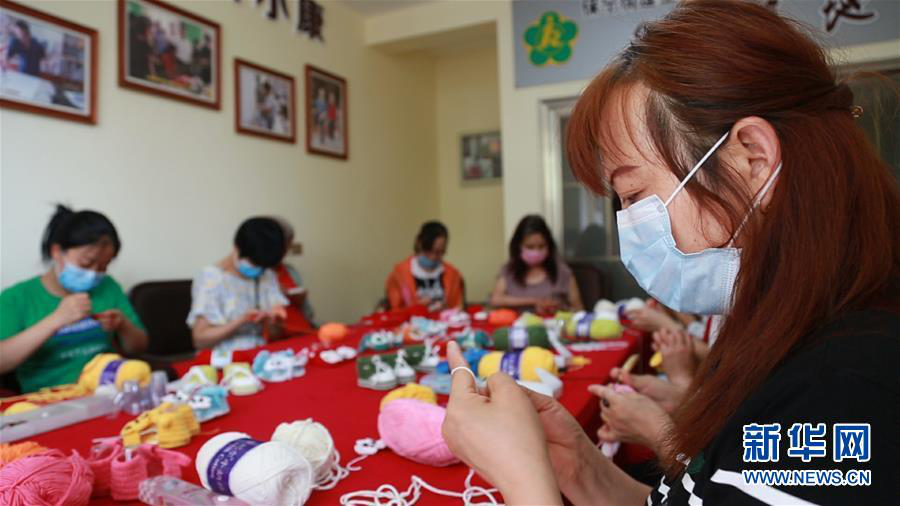
Disabled laborers make children’s shoes at a sewing workshop in Langzhong city’s Wangjiazui community. (Xinhua/Yang Jin)
Li Ronghua is an employee at a sewing workshop in Deyang village, Langzhong city, making children’s shoes with woolen yarns and knitting needles. The 36-year-old is a member of a household that was registered as impoverished a few years ago and is paralyzed in both her legs. She tried to get out of poverty before but did not succeed because she lacked useful skills. In 2018, the local disabled persons' federation established a sewing company designed to benefit people with disabilities and provided related training, and Li soon became a prominent employee.
“At first, I was embarrassed to take part in the training because I thought people might laugh at me,” Li commented and explained that disabled persons' federation staff eventually convinced her to participate in the program, however. Li has also engaged in online education in her spare time. Her efforts made it possible for her to achieve stable income and escape from poverty. “As a handicapped person, I am so happy to be able to support my family on my own,” Li concluded.
Located at an average altitude of 2,300 m deep in the Daliang mountains, Gumo village in Zhaojue county, Liangshan Yi autonomous prefecture has long been impoverished, and it has been very difficult to improve the situation. Ediquxi and her chronically ill husband were considered to be the most impoverished residents and became the focus of special efforts by local poverty alleviation officials.
Ediquxi and her husband eventually began raising pigs and chickens and were able to emerge from poverty. The Gumo native was able to move out of her old adobe home and into a new residence and later launched a Yi-style homestay business that generates more than 50,000 yuan (US$7,200) of income a year.
“Hard work is necessary in order to live a prosperous life. I plan to help more women get out of poverty,” said Ediquxi, the person who was once the poorest in the whole village, but is now helping her neighbors out of poverty.
The hardworking spirit of Bazhong has become ingrained in the province’s formerly poverty-stricken people. They have showed in an impressive way that “happiness comes from doing one’s utmost.”
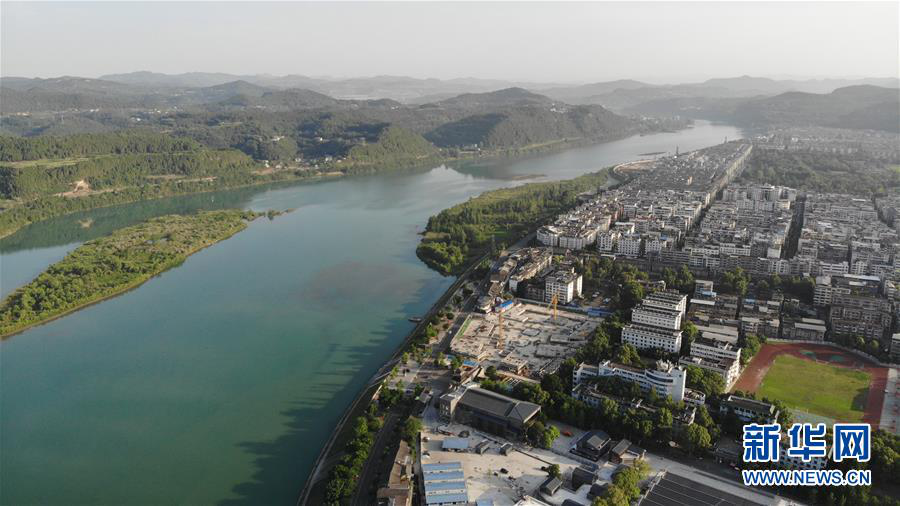
A morning view of Langzhong city, Sichuan province (Xinhua/Yang Jin)
Pursuing prosperous lives and bright futures
“Growing grapes allows me to live a better life,” 33-year-old Guoyuan village resident Zhang Xiong stated recently. “I have been able to marry my wife. She gave birth to our son. We bought a car, and moved into a new house.” The Zhang family runs a vineyard producing eight varieties of grape in Pengshan district, Meishan city, Sichuan province.
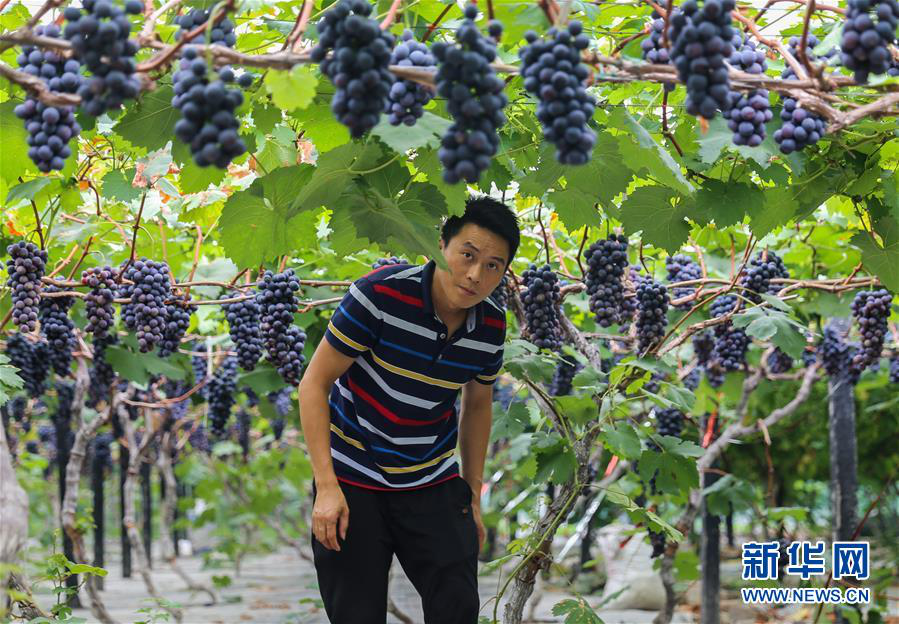
Zhang Xiong examines grapes at his plantation in Guoyuan village, Pengshan district, Meishan city, Sichuan province. (Xinhua/Wang Xi)
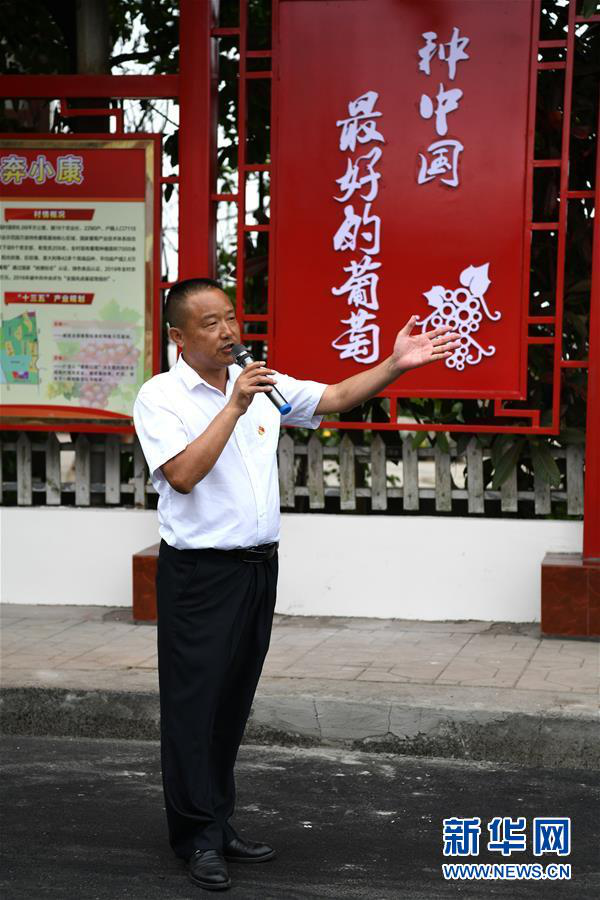
Li Yongwei, Party secretary of Guoyuan village, Pengshan district, Meishan city, introduces the village’s grape industry. (Xinhua/Wang Xi)
“We explored different options and ultimately decided to focus on pursuing the grape industry,” Li Yongwei, Party secretary of Guoyuan village in Pengshan district, Meishan city, recalled when discussing the transformation that he has overseen. Traditional agriculture used to dominate the more than 466 ha of farmland in the village a decade ago, and the hamlet was very underdeveloped. “We started with a 0.13-ha trial plot and later began growing the fruit on more than 346 ha of land, which has made it possible for local residents to earn an average of 31,000 yuan (US$4,464) of annual income at present,” he continued.
Innovative, targeted efforts based on local conditions have been helping to revitalize Sichuan’s rural areas and advance the development of a moderately prosperous society, which has resulted in the province’s residents experiencing a sense of gain and becoming happier and more secure.
Measures have been taken to promote civic virtue in Jingu village, Lezhi county, Ziyang city, for example. An incentive system known as the “Virtue Supermarket” was established in order to identify outstanding endeavors in the village such as environmental sanitation, neighborhood relationship, and filial piety, and the residents who are recognized for their contributions receive credits that can be used to purchase essential goods at the special supermarket.
“We're now living a much better life,” 67-year-old Wang Xianrong mentioned while smiling. He and his wife exchanged some credits for a jug of rapeseed oil, five bags of dried noodles, and some tissue paper.
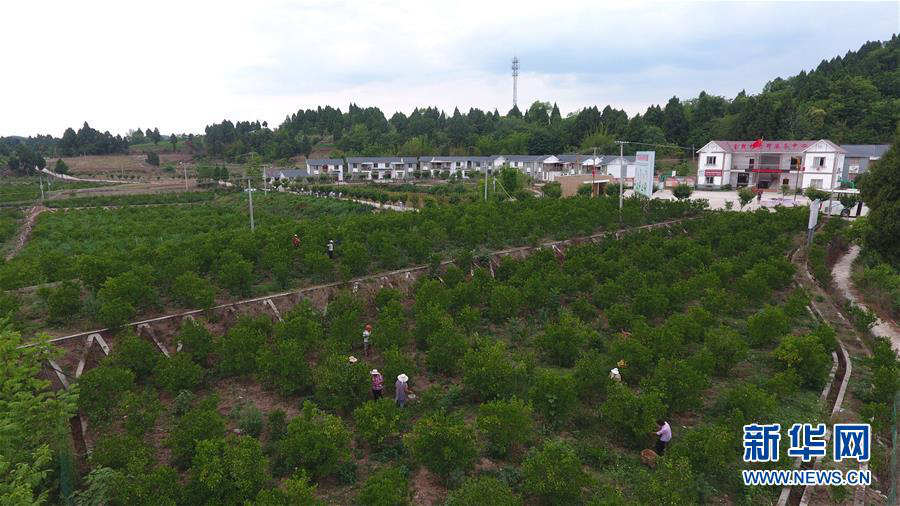
Jingu village residents in Lezhi county, Ziyang city work at a local orange orchard. (Xinhua/Wang Xi)
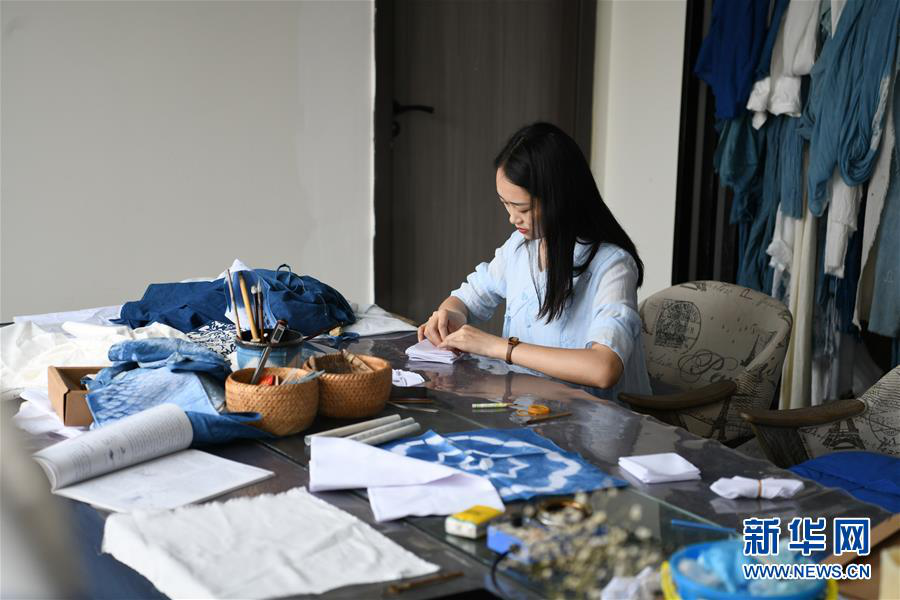
A beginner learns how to tie-dye fabric at a studio in Gaohuai village, Jingyang district, Deyang city. (Xinhua/Wang Xi)
Gaohuai village, Jingyang district, Deyang city was once impoverished but has transformed into a glamorous sightseeing destination that now features cafés, tie-dye studios, shops that sell intangible cultural heritage products, and other businesses scattered among the rivers and green mountains in the area. Its residents earned more than 23,000 yuan (US$3,312) of income per capita in 2019.
“My dream was to live a more prosperous life,” Gaohuai resident and café owner Liu Xuemei explained. “Opening a coffee shop has made it come true.”
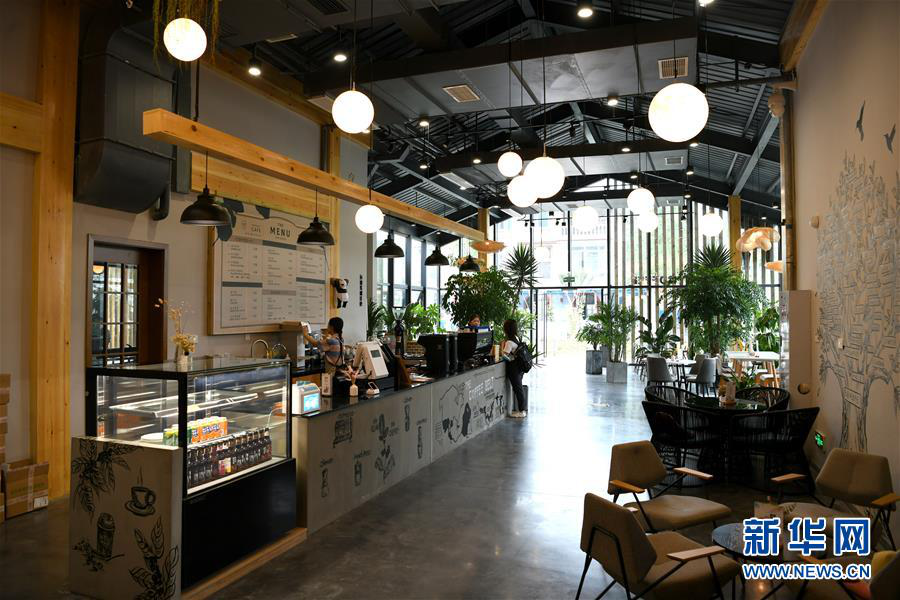
A café in Gaohuai village, Jingyang district, Deyang city, Sichuan province (Xinhua/Wang Xi)
The number of counties that are impoverished in Sichuan decreased from 88 at the end of 2013 to seven at the end of 2019, and the impoverished population contracted from 6.25 million people to 203,000 during this period, which led the poverty rate to recede to 0.3 percent from 9.6 percent. The province is currently working on eliminating absolute poverty in its borders entirely, and a new, prosperous Sichuan is expected to be presented to the world soon.